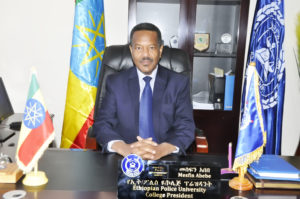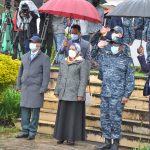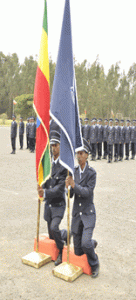Paper published on 2021 by our University:-
Illicit Firearms Trafficking in Ethiopia: Motivating Factors, Consequences and Control Challenges
Sisay Tesema (LLM), Melaku Tefera (MSc), Abdulfetah Endriss (LLM), Abdo Beshir (MA) *Lecturers, Ethiopian Police University
Now days the illicit trafficking of firearms become a great threat to the peace and security of Ethiopia. Throughout the whole year, in all parts of the country the seizure of illicit firearm is the agenda of many medias, security organs, and the people .As result, the title of this study (Illicit Firearms Trafficking in Ethiopia: Motivating Factors, Consequences and Control Challenges) opted to explore on illicit trafficking of firearms as the main objective of the study and what factors contribute for illicit firearms trafficking , consequences resulted and control challenges are the core questions that the study tried to get an answer. The study is conducted by qualitative approach and its findings revealed that there are problems in relation to pushing and pulling factors contribute for the illicit firearms trafficking. The pulling factor includes the prevalence of heavy truck drivers to offer illicitly trafficked firearms, the existence of agents to traffic firearms, the involvement of security forces in supplying illicit firearms. The pushing factors includes, inter alia, deterioration of peace and security in the country, problem of possession of gun as culture, providing self-defense as a justification etc. These factors ultimately lead the creation of illicit firearms trafficking in Ethiopia. In all areas of the country there is massive illicit trafficking of firearms that resulted in the death of many children, elderly and youths. And it also affects the economic, social, political, and psychology of the people. Therefore, the study recommends that though the attempt made by the government to curb illicit firearms is encouraging, it does not guarantee the creation of a country free from illicit firearms trafficking to the level or degree required which has impacted the overall peace and security of the country. Instead, the government should take measures necessary to rectify factors that contribute for the illicit firearms trafficking. The law enforcement measure of the government must be effective for the prevention of illicit firearms trafficking. And also the government should increase the awareness of the people to avoid the demand side.
Police Professionalism in Ethiopia: (Historical development, Current Practices, Challenges, and Factors)
Damite Wudu (MA), Abebaw Tilahun (MA), Kumlachew Derso (MA) *Lecturers, Ethiopian Police University
Abstract
Police professionalism is very decisive in law enforcement, without it maintaining order, getting public trust and confidence would be difficult; it is with this assumption that this study was conducted. Hence, the main objective of the study was to assess police professionalism development, current practice, and challenging factors in Ethiopia. To attain these objectives, the assessment followed a mixed approach with sequential exploratory mixed design. Data were collected using a survey questionnaire for 1014 participants, interview and document review, by employing purposive and multistage cluster sampling from police organizations, concerned stakeholders, and community members. Descriptive statistics and thematic analysis were used to analyze data accordingly. The findings showed that police professional history has a long root as early as 1942 with the establishment of Abadina College. However, every regime used the police force to its advantage than improving professionalism, and currently, the majority of police officers (95.2%) had a contextual understanding about professional policing yet every police officer wasn’t acting accordingly, and hence police professionalism deteriorated. the study also revealed that there was police accountability during the use of force and exercising discretionary power but there was also reduced use of modern technology and the absence of standardized working doctrines at the current practice of police professionalism. Regarding factors, two major areas challenge policing, weak management support, and not respecting positive police cultures were identified as organizational factors. While reduced cooperation and governmental interference on police professional autonomy were recognized as environmental factors affecting police professional development. Similarly, shortage of police logistics, absence of a legal framework for police professionalism, biased media framing report on police, and lack of clear organizational and hierarchical structures were identified as challenges for implementing professional policing. The study further showed gender, rank, and positions were improperly used and affecting professional policing development. The study concludes that even if there is a contextual understanding of professional policing, because of different factors and challenges no improvement was found rather it declines. So, the researchers believe that the implementation of the recommendations such as strong technological support, standard recruitment, and the national police doctrine will contribute to the development of police professionalism.
Keywords: Police, professionalism, professional development
Implementations, Challenges, and Opportunities of Community Policing in Ethiopia
G/Kirstos Tesfay (MA), Negese Asnake (LLM), Nigatu Ermias (MA), Lecturers, *Ethiopian Police University
Abstract
The purpose of this paper is to explore the current implementation, challenges & opportunities of community policing in Ethiopia. The study employed concurrent triangulation research design and mixed research approach. Interview, focus group discussions, document review and questionnaires were methods of data collection used in this study. Accordingly, higher police officials at federal and regional level and chairpersons of community policing advisory council were interviewed. FGDs were conducted with members of advisory council at Kebele. 1920 questionnaire was filed by households. The quantitative data were analyzed using SPSS version 25 while theatric method was employed to analyze qualitatively collected data. Data collected using all methods of data collection was triangulated. Findings of the research indicated that implementations of community policing were good before two years, but due to the social and political disturbances, it has been suspended in most of the study areas since the last two. The principal challenges faced in implementing community policing are lack of adequate finance, budget, materials, training, human resources/manpower, and balanced capacity to perform activities, high rate of youth unemployment, lack of electric power lights as theft and criminal individual needs dark areas and they commit a crime in hidden areas, lack of halls for community forum meetings, lack of surveying, researches, supervisors, and evaluation about the status of community policing, lack of adequate equipment and facilities. The finding further revealed that the existence of community policing structures from federal up to Kebele (Qetena) level, the existence of partnership between police and community and other stakeholders are good opportunities for the furtherance of community policing. Therefore, Police commission should assign at least two diploma community policing graduates at each Kebele and allocate sufficient resources for administrative task of each community policing centers. The government should ensure rule of law over extremist activists & political party member.
Keywords: Community Policing, Community participation, challenge, opportunity, best practice
Police Practices in Electoral Processes in Ethiopia: A Lesson for Upcoming Election
Dagnaw Kebede (MA), Betemariam Alemayehu (MA), Abebe Algaw (LLM), Wario Elemo (MA), Deresse simegnew (MA), Birhane Seyoum (MA) *Lecturers, Ethiopian Police University
Abstract
This study explored the practice of police in electoral processes in Ethiopia to indicate lessons for upcoming election using exploratory qualitative case study design. 42 interviewees were selected purposefully from five police commissions, four organizations and three political parties. Data were collected using semi-structured interview with 42 participants and analyzed using thematic analysis method. Accordingly, three themes: The role and practices of police in election process in Ethiopia, challenges and limitations of police in election and the way forward to enable police to achieve its role in the election were developed. This study revealed that police impartiality in election process was contested and it is especially evident in the partisanship of the police with the ruling party due to the systematic influence of the ruling party. While political interference and police structure challenged the functions of police, limitations include recruitment and training, lack of awareness, lack of adequate human resources and logistics, and lack of benefits which weaken police independency. Police have had both a manifest and latent function for the ruling party. The manifest functions of police were used as coverage for democracy and the latent function as machinery for the ruling party to sustain its power as pretending law enforcement. This study suggested the need for continuous efforts from police, government and political parties through developing a habit in rule of law instead of some personal interests. Specifically the police institutions must undergo profound reform to proclaim its non-partisanship and its competent service delivery.
Key words: election, police practice, Ethiopia, ruling party
The Practice and Challenges of Police Structure in Law Enforcement in Ethiopian Federal System
Kumsa Dekeba (MA), Asmare Zelelaw (MA), Maru Abdi (LLM), Gezahagn Alemayehu (MA) *Lecturers, Ethiopian Police University
Abstract
The Constitution of EPRDF gives the power to states to establish and administer a state police force and to maintain public order and peace within their state. Based on this all regional state police commissions have their own police structure. There were no legal grounds which clearly set down what the structure of regional police commission looks like as well as federal police Commissions at national level. The objective of this research is to investigate the practice and challenges of police structure and law enforcement in the federal system in Ethiopia. To this end, this paper employed qualitative research approach with the utilization of descriptive case study. The data were collected from both primary and secondary sources through key informant interview, focused group discussion and document analysis and analyzed by using thematic analysis. The sample sizes were 70 and the participants of this study were selected purposefully based on their knowledge, engagement, and experience in dealing with law enforcement practice and activities. The results of this study revealed that the relationship between the Federal Police and state police commissions as well as horizontal relationship among regional police commissions are not constitutionally guided and managed. Moreover, there is no legal framework within neighboring regional police commissions to prevent and conduct cross-border crime and there was a power competition among different regional police commissions, difficulty to develop the police profession in uniform standard at all levels. There should be laws, regulations and directives which clearly show the vertical and horizontal integration between Federal Police Commission and State Police Commissions and these laws and regulations should be developed with the involvement of all stakeholders.









